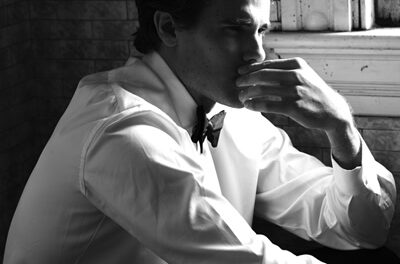It was an evening for new faces at Belk Theater – and plenty of unfamiliar music – as Charlotte Symphony welcomed Sara Davis Buechner as guest soloist for Clara Schumann’s Piano Concerto, and Kensho Watanabe appeared for the first time at the podium. Drawing the largest Symphony audience we’ve seen since the start of the pandemic, Tchaikovsky’s ever-popular “Pathétique” Symphony No. 6 was not merely the only familiar piece on the program, it was also the only music by a male composer. Even in the absence of music director Christopher Warren-Green, the audience seemed to delight in the balance of adventurous and beloved fare.
Watanabe helped put our minds at ease about Anna Clyne‘s “Within Her Arms,” telling us that it was written as a memorial to the composer’s mother. A certain solemnity of the tableau we saw onstage – 15 string players, all standing except the three cellists – also led me to expect harmonies that were respectful and consoling rather than raucous. At the start, the tone actually seemed thin, wan, and weepy, rich with treble. When the lower strings began to assert themselves, the tone veered toward grief and hurt. Repeated six-note phrases briefly put me in mind of Samuel Barber’s funereal Adagio, but Clyne put more variety into her 2009 composition, breaking it into multiple sections. None of them were at all sunny, but the piece eventually swelled to more passionate, anguished heights and collective grieving. Although concertmaster Calin Ovidiu Lupanu‘s voice was the most frequently heard in this community, Clyne doled out poignant asides to other soloists, and her ensemble passages were a controlled combination of harmony, dissonance, and individual lines. In the absence of any tracks on Spotify or Apple, the only performances I could compare this one with were a couple of live videos on YouTube, and Watanabe clearly made more of the dynamic contrasts than I found in either of those.
Schumann’s concerto, written at the age of 14, over six years before her marriage to Robert Schumann, was temporarily known as the Clara Wieck Piano Concerto. It premiered in 1835 with the prodigy herself at the keyboard and Felix Mendelssohn wielding the baton. Buechner wasted little time in demonstrating how sensational Schumann needed to be in performance to play her own concerto. The musical voice of the composer seemed to be heavily influenced by Chopin in the opening Allegro maestoso, more when Buechner played than in the orchestral prelude. That impression carried over into the ensuing Romanze, played without pause, where a nocturnal solo turned into an ardent cello sonata, Chopin’s preferred chamber music format. Principal cellist Alan Black played with admirably rich tone and expression, and only a couple of foreboding rumbles from principal timpanist Jacob Lipham were necessary to transition us to Schumann’s Allegro finale, probably the most individual of her three movements. Certainly it was the sunniest music of the evening so far, and gave Buechner her best opportunities to show us her power and finesse. A responsive exhilaration thundered back from the orchestra as Watanabe cued the heavy artillery.
Daniele Gatti and Charles Dutoit lead the list of notables who have presided over Tchaikovsky’s “Pathétique” in live Charlotte performances over the past 25 years, so there were plenty stellar quality comparisons that local music lovers could make between Watanabe and what they had heard live or on CD. With this touchstone of the classical repertoire, we could see that this American conductor was a stickler for detail, reveling in the sweep of phrases and subtle – or sudden – changes in dynamics. When Watanabe and Charlotte Symphony reached the sudden sforzando in the Adagio-Allegro opening movement, they nearly punched my heart out as thoroughly as Dutoit had done when he led the Royal Philharmonic into Belk Theater in 2006. Aside from the meticulous detailing, pacing, and dynamics from Watanabe, the woodwind principals excelled, beginning with bassoonist Joshua Hood and culminating with Taylor Marino‘s wondrous recap of the familiar “Summer Night” melody. The whole cello section gleamed, easing us into the luxurious Allegro con grazia second movement, gliding along in 5/4 time.
I had to worry that the wonderful Adagio-Allegro, so resplendently rendered, might draw a premature ovation from Symphony subscribers, but they managed to restrain themselves until the rousing penultimate Allegro molto vivace, which always garners a wild ovation. We could almost hear the march melody, which eventually becomes so overpowering and triumphant, bubbling up in little hints from near the beginning of the movement, so detailed was this performance – and Marino became more festive in his playing, adding some grain to his tone. Of course, the enduring shock and innovation of the “Pathétique” is its dark and somber final movement, a tenebrous descent that begins with three cellos and a tuba calling out; resolving lower, deeper, and softer with the cellos and basses; all treble a distant memory. Remarkable that Charlotte Symphony would program “Pathétique” and the similarly lugubrious Mahler Ninth less than a month apart, but they have now done well by both.











